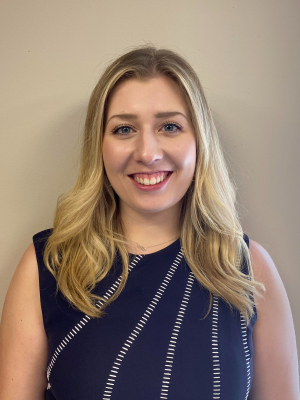Dr Allie Decker takes pride in building new connections with people. She loves meeting new patients, hearing their stories, and forming new relationships. It brings her so much joy! Dr Decker is one of the developmental, rehabilitative, and pediatric optometrists on staff. She focuses on treating binocular vision concerns and improving functional vision in all patients, including those who have suffered traumatic brain injury and those with neurodevelopmental disorders. This is such a dynamic subdivision of Optometry that it always affords the opportunity to learn something new.
As the daughter of an educator, she learned the importance of being a lifelong learner at an early age. Additionally, she always appreciated and admired the difference you can make in students' lives at such a young age. Given this exposure, Dr Decker naturally adopted a passion for caring for the pediatric population. Vision rehabilitation requires very similar skill sets to those of an educator, which is why it is no surprise that she gravitated toward this niche in the field of optometry.
In the ninth grade, Dr Decker was encouraged to research a career that she was interested in. Being an eyeglasses wearer at the time, she considered a career in Optometry. Dr Decker researched the career, its opportunities, and its potential to make a difference in the world. After completing this project, young 14-year-old Allie made her own decision! From that point onward, she never swayed from my decision to pursue a career in Optometry.
Dr. Decker tries her best to give patients ample time to digest the clinical findings and always asks them if they have any questions before they leave the room. Knowledge is power - it is very important to her that her patients feel comfortable with their treatment plan and get sufficient background to understand my decision-making process.
Honesty is the best policy. Dr. Decker is always upfront with her patients regarding what to expect when she performs a particular procedure. Verbally educating or counseling patients to adequately prepare them before conducting a foreign procedure has always helped relieve any tension experienced in the examination room. For her pediatric patients, she often makes things more playful and has them think of her testing sequence as a series of challenges in a game that they need to accomplish. You frequently hear more laughs/giggles than not when passing by her examination room! Laughter is the best medicine and the best way to relieve any tension.
Dr Decker always tells her patients how much she advocates for lifelong learning. To effectively learn, one must have an efficient functional vision. The brain and eyes operate harmoniously to work as effectively as possible. It is important to remember that for this system to remain in balance, you must care for your eyes! This requires being mindful of signs of visual fatigue and listening to your body. Take a break when your eyes are tired, reduce screen time, drink plenty of water, follow a healthy diet, and sleep well! This is critical for the eye-brain connection to operate as smoothly as possible - and for your brain to keep learning!
Blue light-blocking glasses are going to treat your computer difficulties! Many patients with visual eyestrain reach for blue light-blocking glasses to remediate symptoms. Being on the computer or spending extended time on digital devices can cause visual stress. It is important to determine if there are underlying near-point stress difficulties causing symptoms prior to reaching for the blue light blockers! We do this by assessing your eye teaming and focusing systems with a sensorimotor evaluation.

